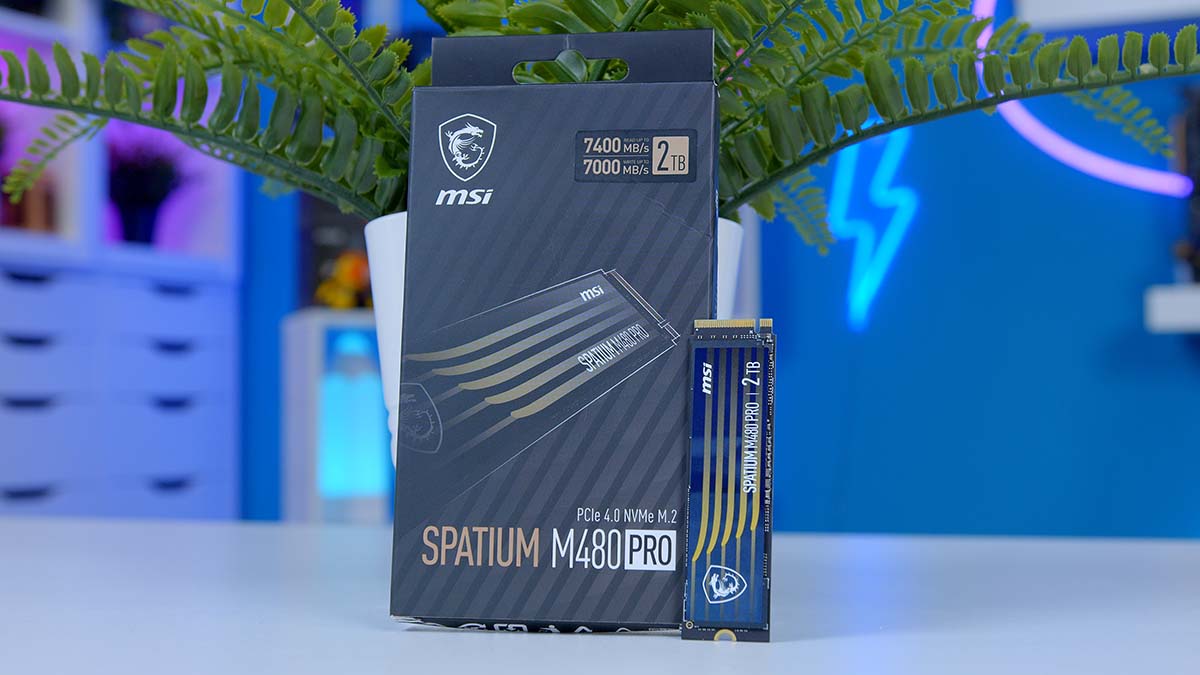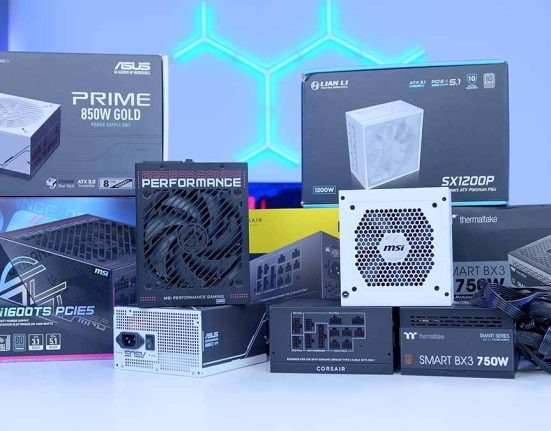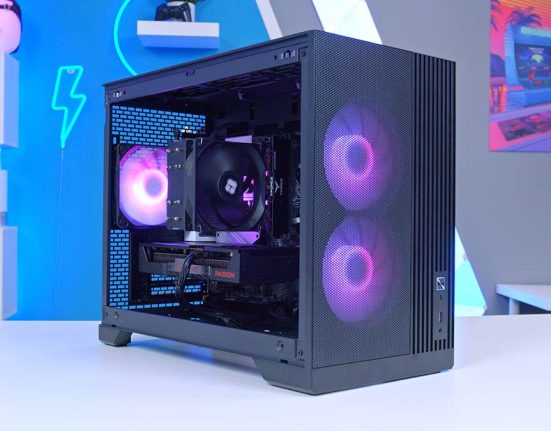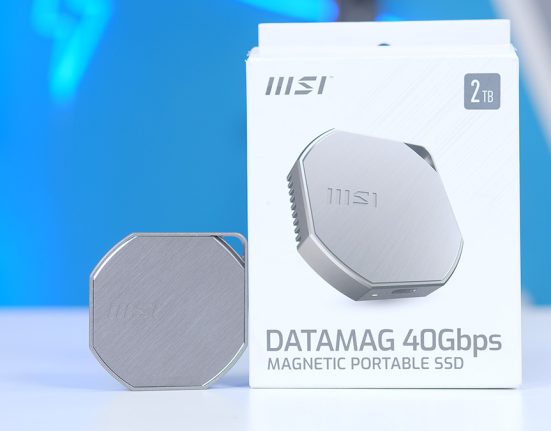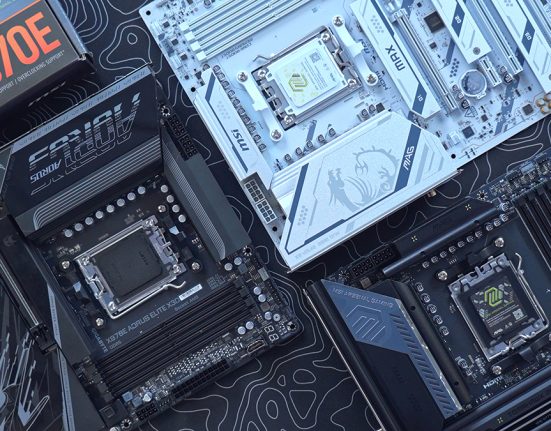The MSI Spatium M480 Pro is a Gen4 NVMe M.2 SSD offering solid read and write performance. MSI claims this drive can reach speeds up to 7400MB/s and 7000MB/s, aligning it with SSDs like the Seagate Firecuda 530 and the Samsung 990 Pro. However, the true way to determine if this drive is a solid competitor is with some benchmarks! That’s why we’ve tested the MSI Spatium M480 Pro to see how it fares, testing its read and write speeds alongside thermals.
The Gen4 SSD market has been competitive for some time, with drives like the Crucial P3 Plus and Lexar NM790 being many builders’ go-to options. This puts the Spatium M480 Pro in a tricky position, as it will need to compete with the affordable pricing of existing drives while offering similar or better performance. However, we’ll reserve judgment until later.
This article examines the MSI Spatium M480 Pro in great detail, analysing its specifications, design, thermals, and performance to determine whether it’s worth considering compared to the alternatives.
Buy the MSI Spatium M480 Pro on:
Specification
The MSI Spatium M480 Pro is a Gen4 M.2 drive utilising the 2280 form factor. The majority of modern motherboards support this size, so the Spatium M480 Pro will have no issues slipping underneath a motherboard SSD heatsink. The Spatium M480 Pro has three different capacities: 1TB, 2TB and 4TB. It’s great to see more manufacturers provide 4TB options, as games have increased in size over the past few years.
Regarding performance, as we alluded to in the introduction, the Spatium M480 Pro is alleged to operate at 7400MB/s on the reads, placing it above the Seagate Firecuda 530 and Samsung 990 Pro. At the same time, write speeds vary based on capacity. Those wanting strong write performance must ensure they pick up a 2TB or 4TB drive, as the 1TB capacity is limited to 6000MB/s instead of the 7000MB/s speeds on the larger variants.
| Specification | MSI Spatium M480 Pro |
|---|---|
| PCI-E Generation | Gen4 |
| Capacity | 1TB 2TB 4TB |
| Sequential Read Speed | 7400MB/s |
| Sequential Write Speed | 1TB: 6000MB/s 2TB, 4TB: 7000MB/s |
| Warranty | 5 years |
| Endurance | 1TB: 700TBW 2TB: 1400TBW 4TB: 3000TBW |
| Form Factor | M.2 2280 |
The performance of this drive is particularly interesting because it would make the Spatium M480 Pro one of the fastest Gen4 SSDs on the market. The best theoretical performance possible tends to cap out around 7500MB/s, so the supposed 7300MB/s that the Spatium M480 Pro offers has the potential to be highly impressive.
Moving onto warranty and endurance, the Spatium M480 Pro has a limited warranty of up to five years or covers for the maximum TBW (terabytes written) value, whichever of these comes first. Five years is standard for most storage drives, but it’s a solid value add that we’re happy to see nonetheless. The endurance ratings differ based on the drive size, starting at 700TBW with the 1TB version, 1400TBW at 2TB, and 3000TBW at 4TB.
At the time of writing, the MSI Spatium M480 pro is priced around $159-$160 for the 2TB version. I don’t feel this is an unfair ask, especially as 2TB is plenty of space. However, if we compare it to a drive like the Lexar NM790, there’s a difference of around $30, with the NM790 sitting at $129.99. Considering the read and write speeds are very similar, it’s difficult to recommend the Spatium M480 Pro at this stage, but hopefully, the benchmarks prove otherwise.
MSI Spatium M480 Pro Design
As expected, this non-heatsink SSD has a pretty basic design overall. It uses the 2280 form factor, which means it is 22mm wide and 80mm long. Most modern motherboards support this form factor, so you won’t have issues slipping this into an X870 or Z890 board.

The drive is predominantly black and features a small label on the flash chips showcasing the name and capacity. This label typically acts as a heatspreader for heatsinks, providing a larger surface area for any passive cooling to sit on. This ensures the drive will remain cool, as it has no fans or an integrated heatsink to keep temperatures down.

Ultimately, it would be nice to see some RGB lighting on the Spatium M480 Pro or a unique design that spices up the aesthetic a little bit more, especially for those with motherboards that don’t have additional heatsinks. However, this won’t be a deal-breaker for everyone, as the Spatium M480 Pro will likely be installed into an M.2 slot and forgotten about. It’s not the kind of component you rely on to make or break the style of a PC build.
The main takeaway of the design is that it’s built for function over form, hence its more barebones aesthetic than that of a drive with an integrated heatsink. However, the primary way to tell if the functional design is a strong suit of this drive is by analysing the thermals, which we’ll do later.
Do You Need An SSD With An Integrated Heatsink?
Over the past few years, several SSDs have hit the shelves with an integrated heatsink. This means the manufacturer has directly built a proprietary heatsink on top of the drive to dissipate heat, resulting in improved thermals. However, the one big caveat of these drives is that they are often quite expensive compared to their non-heatsink counterparts. Which begs the question, do you even need one?
As a general rule of thumb, picking up an SSD with a fancy heatsink isn’t a requirement if your motherboard offers a heatsink that sits on top of your drive. Gen4 SSDs, while incredibly fast, don’t put out a ridiculous amount of heat even under load. Looking at thermal data from SSDs we’ve reviewed previously, the Seagate Firecuda 530R outputs an average of 49°C under load, while the TeamGroup MP44L hovers around the 55°C mark.

We’d consider these results safe. It’s unlikely that either of these drives would throttle to much higher temperatures, even with a more demanding workload. The main point is that these results were taken from drives without an integrated heatsink.
So what is the performance like with drives with a heatsink to ensure things stay cool? Our data shows that the MSI Spatium M480 heatsink model offered an average of 46°C, a fairly minuscule 3°C less than the Firecuda 530R. Alternatively, the Corsair MP600 Elite hovered around 42°C on average. While the latter of the two is better, when buying a heatsink drive, you’re not looking at a gigantic improvement overall, which puts into question the value of these drives to a degree.
Thermals
One of the key metrics that we assess SSDs on is temperature. A multitude of drives exist on the market, and if manufacturers can nail pricing, performance and thermals, then it’s a component that’s likely worth considering. To test this, we benchmark all our SSDs within CrystalDiskMark with HWMonitor running in the background. This lets us capture real-time temperature data, gauging how an SSD performs.

During our benchmarking run, the MSI Spatium M480 Pro maintained an average temperature of 75°C. There were spikes up to 80°C, but this drive generally sat at 73°C-75°C. The results here aren’t great. The majority of Gen4 SSDs that we’ve tested showcase reasonable temperatures (between 50°C to 60°C), but the data we’re seeing from the Spatium M480 Pro is akin to that of a Gen5 SSD, which can run very hot. Ultimately, all SSDs will differ in temperatures, but the M480 Pro is one of the weaker options compared to alternative drives.
Performance
To determine the MSI Spatium M480 Pro’s speed, we fired up CrystalDiskMark. We’ve used this application throughout our SSD testing. This benchmark provides us with the strongest theoretical read and write performance of a singular drive. It reads and writes small files to and from the SSD, then returns the speeds measured in ‘MB/s’ (megabytes per second).
In this benchmark, the MSI Spatium M480 Pro read speeds were 7086MB/s, while the writes held firm at around 6688MB/s. Unfortunately, these speeds don’t quite meet the advertised rating on MSI’s website. The M480 Pro is supposed to hit reads and writes up to 7400MB/s and 7000MB/s, respectively. However, based on our numbers, you’re losing nearly 300MB/s across the board. These results are within the margin of error we typically give, but they’re still disappointing.

Compared to other drives on the market, the MSI Spatium M480 Pro cements itself between the Corsair MP600 Elite, a drive with an integrated heatsink, or a Samsung 990 Pro. Overall, the performance here is not quite what we were hoping for, and versus a number of alternatives that all offer similar metrics and price points, the Spatium M480 Pro doesn’t massively stand out.
Conclusion
MSI Spatium M480 Pro
Product Name: Spatium M480 Pro
Brand: MSI
-
Design
-
Thermals
-
Performance
-
Value For Money
Summary
The MSI Spatium M480 Pro is a Gen4 SSD I’m not particularly excited about. There are some benefits to picking up this particular drive, such as its decent endurance rating or the fact that it comes with a five-year warranty. But besides this, it lacks standout qualities that would make it a strong competitor in the Gen4 SSD space.
Its read-and-write performance is decent but aligns with similar SSDs released a few years ago. Additionally, during our benchmarks, we saw a high thermal output, which raises concerns about throttling over sustained usage. Strangely, the Spatium M480 Pro is also one of the pricier NVMe drives on the market despite its performance. In summary, those looking for a speedy Gen4 NVMe M.2 SSD will find faster and cheaper alternatives that are well worth considering over the Spatium M480 Pro.
Pros
✅ Decent endurance
✅ Multiple capacities
✅ Solid warranty
Cons
❌ Expensive
❌ High thermals
❌ Doesn’t reach rated speeds


